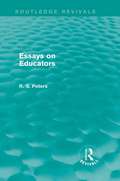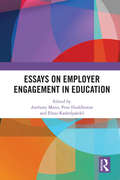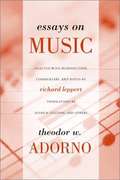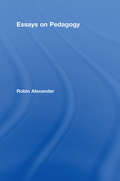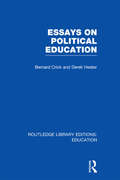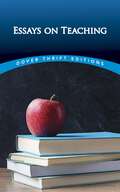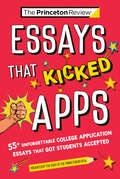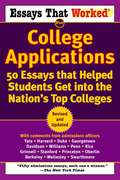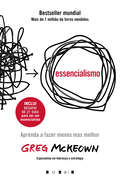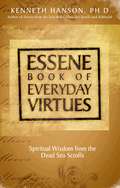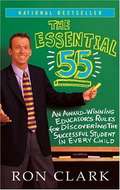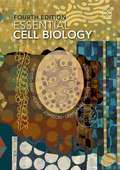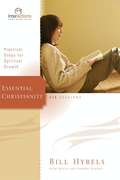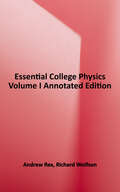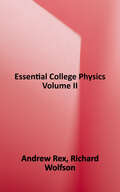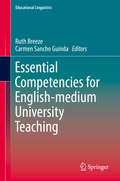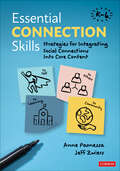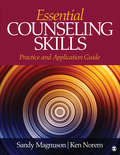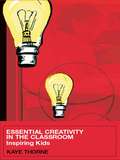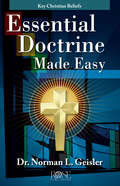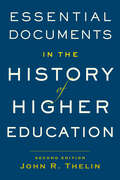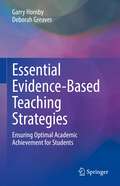- Table View
- List View
Essays on Education in the Early Republic
by Robert Coram Frederick Rudolph Benjamin Rush Noah Webster Samuel Harrison Smith Amable-Louis-Rose De Lafitte Du Courteil Samuel Knox Simeon DoggettOnly a relatively few colonial Americans received any formal education beyond the elementary subjects. Secondary schools were rare. Private tutors and the local clergyman carried the main burden of college preparation. There were public secondary schools in New England, a few private schools in the middle colonies, and even fewer in the South--all of them concentrating on the Latin that led to college and a career in one of the learned professions. Nine colleges of varying degrees of stability and age carried on in the New World the collegiate traditions of Oxford and Cambridge. Several of these institutions were barely able to prove their existence before the American Revolution gave a new twist to their fortunes.
Essays on Educators (Routledge Revivals: R. S. Peters on Education and Ethics)
by R. S. PetersFirst published in 1981, Essays on Educators is a collection of essays on a variety of themes relating to Great Educators. The book is not only an exposition of the thought of these educators but a collection of critical essays in which their writings are used selectively to raise problems of permanent educational interest and importance. The first part explores the education of the individual in society and the development of reason. The second looks at progressivism and tradition in education and includes a critique of Herbert Spencer’s Essays on Education, which are little known. The third part of the book is concerned with tackling educational problems from an interdisciplinary standpoint.
Essays on Employer Engagement in Education
by Prue Huddleston Anthony Mann Elnaz KashefpakdelBuilding on new theories about the meaning of employability in the twenty-first century and the power of social and cultural capital in enabling access to economic opportunities, Essays on Employer Engagement in Education considers how employer engagement is delivered and explores the employment and attainment outcomes linked to participation. Introducing international policy, research and conceptual approaches, contributors to the volume illustrate the role of employer engagement within schooling and the life courses of young people. The book considers employer engagement within economic and educational contexts and its delivery and impact from a global perspective. The work explores strategic approaches to the engagement of employers in education and concludes with a discussion of the implications for policy, practice and future research. Essays on Employer Engagement in Education will be of great interest to academics, researchers and postgraduate students engaged in the study of careers guidance, work-related learning, teacher professional development, the sociology of education, educational policy and human resource management. It will also be essential reading for policymakers and practitioners working for organisations engaging employers in education.
Essays on Music
by Theodor W. Adorno Richard D. Leppert Susan H. GillespieThis unique volume includes twenty-seven essays on music by Theodor W. Adorno, nearly half of which are translated into English for the first time, together with an expansive introduction, commentary, and notes by musicologist Richard Leppert.
Essays on Pedagogy
by Robin AlexanderSeven authoritative contributions to the emerging field of pedagogy and to comparative, cultural and policy studies in education. A must for those who want to do more than merely comply with received versions of ‘best practice’. Pedagogy is at last gaining the attention in English-speaking countries which it has long enjoyed elsewhere. But is it the right kind of attention? Do we still tend to equate pedagogy with teaching technique and little more? Now that governments, too, have become interested in it, is pedagogy a proper matter for public policy and official prescription? In Essays on Pedagogy, Robin Alexander brings together some of his most powerful recent writing, drawing on research undertaken in Britain and other countries, to illustrate his view that to engage properly with pedagogy we need to apply cultural, historical and international perspectives, as well as evidence on how children most effectively learn and teachers most productively teach. The book includes chapters on a number of themes, expertly woven together: the politicisation of school and classroom life and the trend towards a pedagogy of compliance; the benefits and hazards of international comparison; pedagogical dichotomies old and new, and how to avoid them; how education and pedagogy might respond to a world in peril; the rare and special chemistry of the personal and the professional which produces outstanding teaching; the scope and character of pedagogy itself, as a field of enquiry and action. For those who see teachers as thinking professionals, rather than as technicians who merely comply with received views of ‘best practice’, this book will open minds while maintaining a practical focus. For student teachers it will provide a framework for their development. Its strong and consistent international perspective will be of interest to educational comparativists, but is also an essential response to globalisation and the predicaments now facing humanity as a whole.
Essays on Political Education (Routledge Library Editions: Education)
by Bernard Crick Derek HeaterIn the 1960s and 1970s there was a remarkable development of interest in political education not only in Britain but also in other countries, namely the USA, Germany and Australia. This volume provides scholars and teachers in this field with a picture of British work in the area of political education.
Essays on Teaching (Dover Thrift Editions: Literary Collections)
by Bob BlaisdellRich in insights and inspiration, this anthology surveys the challenges and rewards of teaching. Contributions range from essays by renowned educators such as Pestalozzi, Froebel, Montessori, and Neill to the philosophical observations of Plato, Rousseau, Dewey, and Russell. Writings by Tolstoy, Emerson, and D. H. Lawrence appear alongside those of contemporary teachers, including Taylor Mali, Elizabeth Gold, and Philip Schultz, who reflect on their experiences with honesty, humor, and wonder.In addition to essays, this compilation draws upon letters, diaries, commencement addresses, memoirs, and poetry, all of which portray the dynamics of teaching. Editor Bob Blaisdell provides brief introductions to the contributors and their works and contributes an essay as well. Teachers, professors, and students will welcome this thought-provoking anthology, as will others interested in the history and philosophy of education.
Essays that Kicked Apps: 55+ Unforgettable College Application Essays that Got Students Accepted (College Admissions Guides)
by The Princeton ReviewEach year, colleges are inundated with earnest, eager applications. Your own essay may need to shine from among as many as 60,000 others to get noticed! · Get inspired by these 55+ unforgettable student essays that got their authors accepted · See what schools like Cornell, Brown, Georgia Tech, Rutgers, Northwestern University, Duke, and many more are looking for in an essay · Read helpful commentary from our experts on what worked—and why All the essays collected in this book are real examples of successful, stand-out writing, and each is annotated with explanations from The Princeton Review&’s admissions experts about its most memorable or effective techniques. Get reading—and then writing—and let these model essays give you the kick-app advantage!
Essays that Worked for College Applications: 50 Essays that Helped Students Get into the Nation's Top Colleges
by Boykin Curry Brian KasbarEssays that Worked for College Applications offers advice on writing a successful college admissions essay and presents fifty examples.
Essencialismo: Aprenda a Fazer Menos mas Melhor
by Greg McKeownA solução para controlar as suas escolhas, identificar as tarefas importantes na sua vida e fazer menos, mas melhor. Desenvolvido por Greg McKeown, especialista em liderança e estratégia, o Essencialismo é a solução para controlar todas as suas escolhas, identificar as tarefas verdadeiramente importantes na sua vida e fazer menos, mas melhor. Em Essencialismo, Greg McKeown usa a experiência que obteve e as ideias que criou a partir da colaboração com os líderes de algumas das empresas mais inovadoras no mundo (Facebook, Google, Apple, Twitter, LinkedIn) para mostrar como é possível fazer sempre, e apenas, as coisas certas, tornando-se mais produtivo e bem-sucedido no trabalho, e ganhando tempo para a sua vida pessoal. Seguindo os conselhos simples e práticos deste livro conseguirá simplificar a sua vida, o seu pensamento e os seus objetivos, aprendendo a rejeitar as tarefas que são supérfluas e apenas o distraem do essencial. No fim, voltará a decidir por si as suas prioridades e eliminará os principais obstáculos para o êxito, tanto no trabalho como em casa. «Também sente aquela pressão implacável para experimentar todas as coisas boas da vida? Fazer todas as coisas “certas”? A realidade mostra-nos que esse não é o caminho para chegarmos aonde queremos, podendo levar-nos a investir em tantas áreas que os nossos esforços deixam de ter qualquer impacto. Greg McKeown acredita que a solução está em reduzir a vida à sua essência. Com este livro, ele irá ajudá-lo a encontrar o significado do que é essencial para a sua vida.» Daniel H. Pink, autor de Drive, Vender é Humano e A Nova Inteligência «Em Essencialismo, Greg McKeown prova, de forma sustentada, a utilidade de alcançar mais fazendo menos. Neste livro, lembra-nos que um foco claro e a capacidade de dizer “não” são fatores tão críticos quanto desvalorizados no mundo dos negócios, hoje em dia.» Jeff Weiner, ex-CEO do LinkedIn «Este livro tem a chave para a solução de um dos maiores problemas da vida: Como podemos fazer menos e ao mesmo tempo alcançar melhores resultados? Essencialismo é uma leitura intemporal e fundamental para qualquer pessoa que se sinta sobrecarregada, subaproveitada e excessivamente empenhada no trabalho — por outras palavras, para todos. Mudou a forma como penso sobre as minhas prioridades, e se mais líderes adotassem esta filosofia os nossos trabalhos e vidas seriam menos stressantes e mais produtivos. Por isso, deixe o que está a fazer e leia este livro.» Adam Grant, professor na Wharton School e autor dos bestsellers Dar e Receber, Originais e Pensar Melhor «Essencialismo é o antídoto poderoso para a loucura que se espalha atualmente, como uma praga, pelas nossas organizações e as nossas vidas. Leia as palavras de Greg McKeown com calma, pare e pense como deverá aplicar essas ideias à sua vida — depois, será capaz de fazer menos e melhor, e começará a sentir a insanidade a desaparecer.» Robert L. Sutton, professor na Universidade de Stanford
Essene Book of Everyday Virtues: Spiritual Wisdom From The Dead Sea Scrolls
by Kenneth HansonA handbook of spiritual living for contemporary readers based on the 2000-year-old practices of the Essenes.
Essential 55: An Award-winning Educator's Rules for Discovering the Successful Student in Every Child
by Ron ClarkThe runaway bestseller that's a must-have for every parent and teacher. How many authors would travel coast to coast on a bus to get their book into as many hands as possible? Not many. But that's just what Ron Clark, author of The Essential 55, did to keep his book and message in the public eye. And it worked. After his Oprah appearance, sales skyrocketed: we've sold more than 850,000 copies in six months! The book sat tenaciously on the New York Times bestseller list for 11 weeks. Ron Clark was featured on the Today show, and in the Chicago Tribune, Good Housekeeping, and the New York Daily News--not to mention the calls we've received from teachers and parents who want to get their hands on Ron's guidelines for teaching children.
Essential Cell Biology (Fourth Edition)
by Keith Roberts Dennis Bray Alexander Johnson Julian Lewis Martin Raff Peter Walter Bruce Alberts Karen HopkinThis edition provides introduction to the central concepts of cell biology and covers the latest developments in this fast-moving field.
Essential Christianity
by Bill Hybels Kevin HarneyThe essentials of faith. You can build a life on them. Like a house built on a firm foundation, the Christian faith is founded on some key, enduring truths. Do you know what they are? If not, you owe it to yourself to find out whether you’re building your life—and your eternity—on solid ground. Essential Christianity is your invitation to spiritual discussion with others as you explore the basics of faith—principles deeper and more far-reaching than you may have imagined. You’ll learn what it means to really know Christ. You’ll discover the secret to confident living, how to grow spiritually, how to handle your failures, how to follow Jesus in a world that’s anything but devoted to Him, and the different ways God wants to guide you in the practical concerns of life. Interactions—a powerful and challenging tool for building deep relationships between you and your group members, and you and God. Interactions is far more than another group Bible study. It's a cutting-edge series designed to help small group participants develop into fully devoted followers of Christ.
Essential College Physics Volume I
by Richard Wolfson Andrew RexThis book provides students with an approachable and innovative introduction to key concepts in physics. Throughout the text, students enjoy clear and concise explanations, relevant real-world examples, and problems that help them master physics fundamentals. <p><p>Following the introductory Chapter 1, the remainder of Volume I is devoted to the mechanics of particles and systems. It includes separate chapters on gravitation, fluids, and waves, including sound. The text concludes with a three-chapter sequence on thermodynamics. Each chapter features annotated figures and detailed problem-solving strategies to help students learn and retain the material with confidence. <p><p>The second edition includes a new four-color format, with color coding of pedagogical features to call greater attention to each. Additionally, new applications have been added to make select topics more current and engaging, both throughout the text and, when possible, within problem sets. <p><p>Essential College Physics Volume I is part of a two-volume set. It can be used independently or in tandem with Volume II. When combined, the two texts cover a full-year course in algebra-based physics, divided either into two semesters or three quarters.
Essential College Physics Volume Ii
by Richard Wolfson Andrew RexThis book effectively introduces students to critical concepts in physics in an approachable and innovative way. Throughout the text, students enjoy clear and concise explanations, relevant real-world examples, and problems that help them master physics fundamentals. The text begins with six chapters on electricity and magnetism, culminating with a concluding chapter on electromagnetic waves and relativity. Following this are two chapters on optics - one on geometrical optics and another on wave optics. The final four chapters cover modern physics, including quanta, atoms, nuclei, and elementary particles. Each chapter features annotated figures and detailed problem-solving strategies to help students learn and retain the material with confidence. The second edition includes a new four-color format, with color coding of pedagogical features to call greater attention to each. Additionally, new applications have been added to make select topics more current and engaging, both throughout the text and, when possible, within problem sets. Essential College Physics Volume II is part of a two-volume set. It can be used independently or in tandem with Volume I. When combined, the two texts cover a full-year course in algebra-based physics, divided either into two semesters or three quarters.
Essential Competencies for English-medium University Teaching
by Carmen Sancho Guinda Ruth BreezeAs English gains prominence as the language of higher education across the world, many institutions and lecturers are becoming increasingly concerned with the implications of this trend for the quality of university teaching and learning. With an innovative approach in both theme and scope, this book addresses four major competencies that are essential to ensure the effectiveness of English-medium higher education: creativity, critical thinking, autonomy and motivation. It offers an integrated perspective, both theoretical and practical, which defines these competences from different angles within ELT and Applied Linguistics, while also exploring their points of contact and applications to classroom routines. This approach is intended to provide practical guidance and inspiration, in the form of pedagogical proposals, examples of teaching practice and cutting-edge research by scholars and university teachers from all over the world. To that end, a leading specialist in the field introduces each of the four competencies, explaining concepts accessibly and synthetically, exposing false myths, presenting an updated state of the art, and opening windows for future studies. These introductions are followed by practitioner chapters written by teachers and scholars from different cultures and university contexts, who reflect on their experience and/or research and share effective procedures and suggestions for the university class with English as a vehicle for instruction.
Essential Connection Skills, K-6: Strategies for Integrating Social Connections Into Core Content
by Jeff Zwiers Anne Paonessa"Essential Connection Skills is a practical, specific, inspirational, and must-have resource for any teacher, coach, school leader, or parent who aims for a more empowered and successful student." Julie O′Connell Alholm, Instructional Coach and EL Teacher, MN "Essential Connection Skills is a must-read for any teacher—whether you′re already focused on social skills or looking to include them more in your teaching. The suggestions in each chapter are practical for novice to veteran teachers." Amber Quirk, Regional Superintendent, DuPage County Regional Office of Education, IL Foster joy and engagement by building community in your school and classrooms Do your students struggle with low boredom tolerance, lack the confidence and skills needed in social interactions, or find it hard to collaborate? Are you seeing more behavioral disruptions, a wider range of learning challenges, and increased absenteeism? Today’s classrooms need to move beyond traditional teaching methods; they need strategies that will re-engage students and build on meaningful connections. Essential Connection Skills offers practical solutions to help educators reignite the joy of learning through purposeful, reflective interactions. These strategies empower students to build connections, embrace multiple perspectives, and develop the social and academic tools necessary for success. Inside you′ll find: Chapter-by-chapter resources and techniques Assessment recommendations Targeted strategies for culturally and linguistically diverse students Techniques to help students develop self-reflection skills By cultivating authentic engagement, Essential Connection Skills restores a sense of community and purpose in classrooms and empowers students with the lifelong skills they’ll need to succeed. Other Books from Corwin Dohrer, The Schools We Need Now Rogers, The SEL Coach
Essential Connection Skills, K-6: Strategies for Integrating Social Connections Into Core Content
by Jeff Zwiers Anne Paonessa"Essential Connection Skills is a practical, specific, inspirational, and must-have resource for any teacher, coach, school leader, or parent who aims for a more empowered and successful student." Julie O′Connell Alholm, Instructional Coach and EL Teacher, MN "Essential Connection Skills is a must-read for any teacher—whether you′re already focused on social skills or looking to include them more in your teaching. The suggestions in each chapter are practical for novice to veteran teachers." Amber Quirk, Regional Superintendent, DuPage County Regional Office of Education, IL Foster joy and engagement by building community in your school and classrooms Do your students struggle with low boredom tolerance, lack the confidence and skills needed in social interactions, or find it hard to collaborate? Are you seeing more behavioral disruptions, a wider range of learning challenges, and increased absenteeism? Today’s classrooms need to move beyond traditional teaching methods; they need strategies that will re-engage students and build on meaningful connections. Essential Connection Skills offers practical solutions to help educators reignite the joy of learning through purposeful, reflective interactions. These strategies empower students to build connections, embrace multiple perspectives, and develop the social and academic tools necessary for success. Inside you′ll find: Chapter-by-chapter resources and techniques Assessment recommendations Targeted strategies for culturally and linguistically diverse students Techniques to help students develop self-reflection skills By cultivating authentic engagement, Essential Connection Skills restores a sense of community and purpose in classrooms and empowers students with the lifelong skills they’ll need to succeed. Other Books from Corwin Dohrer, The Schools We Need Now Rogers, The SEL Coach
Essential Counseling Skills: Practice and Application Guide
by Sandy Magnuson Ken NoremEssential Counseling Skills: Practice and Application Guide offers practical, step-by-step guidance for developing and applying the skills necessary for careers in counseling. Using the metaphor of a professional journey, this guide provides commentary and background information throughout, as readers are directed in their development of such key counseling skills as empathy, building relationships, case conceptualization, and facilitating change. Deep reflection is further encouraged at every key stage through the integration of theory with a wealth of applied exercises and examples.
Essential Creativity in the Classroom: Inspiring Kids
by Kaye ThorneEssential Creativity in the Classroom is about giving all children the opportunity to fulfil their potential. It is about developing real partnerships between parents, teachers, businesses and the community, identifying best practice, finding teachers that are inspiring and schools that are committed to providing a special learning experience. This is a book to inspire, excite and stimulate creative approaches to learning. Without creativity, we have no real innovation; we need people who are capable of thinking crazy, out of the box thoughts; we need people who shake us out of complacency. This book covers in detail topics such as: What do teachers need to do to help children make the most of their creativity? How do children prefer to learn? What can teachers do to stimulate children’s creativity? building self-esteem, helping individuals to believe in themselves supporting a young person in making creative career choices. Packed with proven practical advice this dip-in guide identifies the best ways of supporting pupils as they navigate their exciting journey through a world of learning and discovery.
Essential Doctrine Made Easy
by Norman L. GeislerEssential Doctrine Made Easy - Key Christian BeliefsWhat are the basic doctrines of the Christian faith? Essential Doctrine Made Easy ebook outlines and explains 14 key beliefs embraced by believers around the world, such as Christ's Virgin Birth, Atoning Death, and Bodily Resurrection. This bestselling ebook looks at each doctrine and asks two essential questions:* "What Do I Actually Need to Believe?"* "What Is At Stake Here?" Essential Doctrine Made Easy will also show you where to find the answers in the Bible. The ebook also includes a glossary of Christian terms, a chart showing how other religious groups treat these essentials, and much more.What are the core teachings of the Bible that have defined Christianity for more than 2,000 years? This bestselling ebook outlines and explains:* God's unity - There is only one God* God's triune nature - One God in three Persons* Christ's virgin birth* Human depravity - No one can win God's favor by their own efforts* Christ's sinlessness* Christ's deity* Christ's humanity* Necessity of God's grace* Necessity of faith* Christ's atoning death* Christ's bodily resurrection* Christ's bodily ascension* Christ's intercession* Christ's second comingEach doctrine is examined by answering specific essential questions. For example:The Doctrine: Christ's atoning deathThe penalty for sin is death--not only physical death (separation of the soul from the body), but also spiritual death (separation of ourselves from God). The penalty we owe to God was paid by Christ through his death on the cross. The acceptable payment had to be perfect, complete, and without fault. Christ, the perfect Man, gave Himself in our place, so that whoever believes in Him will not die (physically and spiritually) but have everlasting life (John 3:16).Question One: What Do I Actually Need to Believe?Only Christ's sinless life, sacrificial death and bodily resurrection can bring us to God.Question Two: What's at Stake Here?The unique nature of Jesus' work of salvation.Reference Scriptures:* For even the Son of Man did not come to be served, but to serve, and to give his life as a ransom for many. - Mark 10:45* He himself bore our sins in his body on the tree, so that we might die to sins and live for righteousness. - I Peter 2:24* For Christ died for sins once for all, the righteous for the unrighteous, to bring you to God. - I Peter 3:18* No one comes to the Father except through me. - John 14:6What do other religions believe?An easy-to-use chart shows how four other religious groups treat the 14 essentials. A key indicates whether the group accepts, redefines or denies each doctrine, enabling the reader to understand the controversies regarding these religious sects. Other religious groups include:* Latter Day Saints (Mormonism)* Jehovah's Witnesses (Watchtower)* Scientology* Christian ScienceEssential Doctrines Made Easy also addresses belief in the inspiration of Scripture and the methods of interpretation, which are important to faith, although not a necessary factor in salvation.Four ancient creeds of the early Church are summarized in the ebook, giving an historical overview of what the Church deemed most essential. These creeds include:* The Apostles' Creed* The Nicene Creed* Athanasian Creed* The Creed of ChalcedonA glossary of Christian terms is included, defining 24 terms which are widely used but not always understood, such as orthodoxy, mediator, grace, deity, and soteriology.
Essential Documents in the History of American Higher Education
by John R. ThelinThe thoroughly updated second edition of this dynamic and thoughtful collection focuses on the issues that have shaped American higher education in the past decade.Essential Documents in the History of American Higher Education, designed to be used alongside John R. Thelin's A History of American Higher Education or on its own, presents a rich collection of primary sources that chart the social, intellectual, political, and cultural history of American colleges and universities from the seventeenth century to the present. The documents are organized in sections that parallel the chapters in A History both chronologically and thematically, and sections are introduced with brief headnotes establishing the context for each source.This updated edition of Essential Documents focuses on the issues that have shaped American higher education in the past decade, from congressional investigations into endowments and court cases about paying student-athletes to accounts of campus protests over racial discrimination and adjuncts struggling in the "gig economy." From the successful fund-raising campaigns of 2014 to the closing of campuses because of the COVID-19 pandemic of 2020, the book also includes• a new tenth chapter, "Prominence and Problems: American Higher Education since 2010," and an updated introduction;• a number of landmark documents, including the charter for the College of Rhode Island (1764), the Morrill Land Grand Act (1862), the GI Bill (1944), and the Knight Commission Report on College Sports (2010); and • lively firsthand accounts by students and teachers that tell what it was like to be a Harvard student in the 1700s, to participate in the campus riots of the 1960s, to be a female college athlete in the 1970s, or to enroll at UCLA as an economically disadvantaged Latina in the 1990s.Thelin even stretches the usual bounds of documentary sources, incorporating popular pieces by Robert Benchley and James Thurber on their own college days as well as an excerpt from Groucho Marx's screwball film Horse Feathers. What emerges is a complex and nuanced collection that reflects the richness of more than three centuries of American higher education.
Essential Elements of Portrait Photography
by Bill IsraelsonCreating an idealized image of a subject is a portrait photographer's job. However, the approach is not quite formulaic. From one subject to the next and one day to the next, there are different goals and scenarios-on Monday, you may be tasked with photographing your subjects under cloudy skies on a beach; on Tuesday, you may need want to downplay your client's wide hips in the studio; on Wednesday, you may want to create dramatic lighting for an actor's portfolio-on-stage. Every day, there is a unique challenge to meet, often under varying conditions. So, how do you make a magically good portrait during every shoot?In this book, Bill Israelson shows you how to tackle the problem of creating a great portrait of your every client. Beginning with a discussion on equipment essentials, breaking the discussion into two topics-gear for studio work and portable equipment for location work.Next, you'll learn simple posing strategies for making women, men, kids, and groups looks their best in any presentation. You'll learn how to position the body from head to toe to maximize assets and downplay common problem areas.Lighting is the backbone of every image. In the studio, you have complete control over every facet of the lighting-from its hardness or softness to its color temperature and direction. On location, the basic principles of good lighting still apply-but the quality and quantity of light is subject to change. Israelson shows you how to harness the available light and supplement it when needed to create saleable images every time.With straightforward, jargon-free text and a wide range of image examples, this book will help you quickly learn how to improve your portrait results to create client-pleasing portraits every time.
Essential Evidence-Based Teaching Strategies: Ensuring Optimal Academic Achievement for Students
by Garry Hornby Deborah GreavesThis book examines evidence-based practices that facilitate effective teaching to ensure optimum educational achievement for school-age students. It identifies key strategies with extensive research evidence that confirms their effectiveness in improving student outcomes. The book offers guidelines for teachers to use in distinguishing between strategies that are evidence-based and those with little or no supporting evidence. It describes common instructional strategies often found in schools despite having little evidence to support their effectiveness. In addition, the book identifies eight key evidence-based teaching practices that can be directly implemented by classroom teachers, reviews the theoretical and research base of each of these strategies, and provides guidelines for special and general education teachers on how to apply them most effectively, with links to video examples of their use in classrooms. The text also examines common barriers to the use of evidence-based practices in schools. It explores implications for teacher education, focusing on training educators to identify and implement evidence-based strategies effectively, avoiding those lacking evidence, even if they are popular in schools. Essential Evidence-Based Teaching Strategies is a must-have resource for researchers, professionals, and graduate students in educational psychology, child and school psychology, and social work who are interested in learning about and implementing effective teaching methods that improve student engagement and academic achievement, strengthen social-emotional learning, and reduce school dropout rates.

